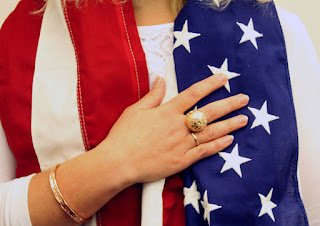 |
| I pledge allegiance to the flag of the United States of America, and to the Republic for which it stands. One nation under God, indivisible, with liberty and justice for all. |
The unity of the United States is one of our nation’s greatest assets. But how did so many groups willingly come together early on under the same flag? Many know that the British had 13 colonies in North America that declared independence. Rebellion and battles are what most historians highlight, but we often forget the lengthy debates, politics, and work it took to create a nation before and after the first shots of war were fired.
Delegates from each colony met for two years before the Declaration of Independence in 1776, organizing, dealing with the King of England, and finding common ground to describe grievances. Before the Revolutionary War began the delegates re-assembled to draft the founding laws of the nation – but many forget we had a first draft. For 12 years during the Revolutionary war and just after, the Articles of Confederation made the United States a nation, loosely drawn together with a Congress but no President or Supreme Court. After the war, smaller conflicts between states led to a call for a new, more robust set of laws to give the nation greater unity. The Congress proposed the current U.S. Constitution as a second draft, which created the foundations of the nation we know today and became the law of the land in 1789, more than a decade after declaring independence.
What made our second draft work was not just what it included, but what it left out. Each state needed some basic protections and statutes, but whatever is not covered in the U.S. Constitution is then left to states to figure out for themselves if they want. This kind of federalism allowed the differences between those early states to remain intact, without slowing down the progress of the nation as a whole.
As states were later added to the Union, this federalism became even more critical to national unity. Each state added saw in advance what basic laws they would be required to follow at the national level, knowing that anything else specific to the state would have to be negotiated with lawmakers at the state level.
Today the United States is greater than the sum of its parts thanks to our federalist system. It provides for diverse people and experiences to live in the same country with minimal conflict, and for leaders to make decisions that can stay at a smaller level, to keep the United States as united as ever.


Nice article. I Just read this blog got a touch about US history and how it has done a great come back by economy, development and many other things.michelle obama campaign
ReplyDeleteThis line made sense in more ways than one “today the United States is greater than the sum of its parts thanks to our federalist system. It provides for diverse people and experiences to live in the same country with minimal conflict, and for leaders to make decisions that can stay at a smaller level, to keep the United States as united as ever.”
ReplyDeleteThe United States is a cooperation as there is always room for compromise so that the different groups can exist amicably. I know another great country in Africa that can do well with this advice-her name is Nigeria.